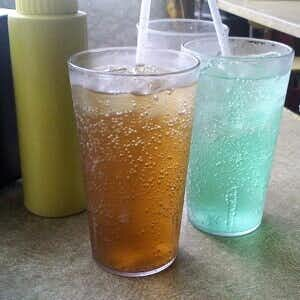
Usually, people are advised to drink plenty of liquids to keep their kidneys healthy and functioning well. A new study suggests, however, that sugary drinks are more of a problem than a help.
What Is the Evidence on Sugary Drinks?
The Jackson Heart Study included 3003 African-American adults (Clinical Journal of the American Society of Nephrology, online Dec. 26, 2018). All had normal kidney function at the beginning of the study. After approximately eight years, about six percent of these people had developed kidney disease.
The volunteers filled out questionnaires about food and drink when the study began. Those who consumed the most sugar-sweetened beverages, including sweetened fruit drinks, were 61 percent more likely to be diagnosed with kidney disease than those who drank the least sweetened drinks. That is a relative risk. However, once the data were adjusted for dietary patterns, the increased risk (37 percent) was not statistically significant.
This is not the first research to suggest that sugar-sweetened beverages might harm the kidneys. Experiments in animals also suggest that sweet drinks can cause trouble.
Dehydration Research in Rats:
Rats were exposed to heat for an hour (American Journal of Physiology-Regulatory, Integrative and Comparative Physiology, June, 2016). Since they had no access to fluids during this time, they became mildly dehydrated. The animals were then randomly assigned to drink plain water, water with the sweetener stevia or sugar-sweetened water. This contained fructose and glucose sugars equivalent to the amounts found in most soft drinks.
Rats that drank water sweetened with fructose and glucose consumed more fluid but were more easily dehydrated when the water restriction was repeated. They also were more likely to experience kidney damage as a consequence of the repeated dehydration.
The rats whose water was sweetened with stevia, a non-caloric natural sweetener, appeared no worse off than those drinking plain water.
How Should You Quench Your Thirst?
If humans react in similar ways, people should not rehydrate with sugary drinks like soda when the weather is hot. Plain water might be best except for those who are exercising heavily.
Marathon Runners Who Drink on Schedule:
For them, an electrolyte beverage might be prudent to avoid hyponatremia. Some long-distance walkers or runners who drink lots of water during their event end up with too little sodium in their bodies, since it too is lost through sweat. This can be a life-threatening situation. Experts recommend letting thirst guide fluid replenishment rather than sticking to a schedule.
Avoiding Hyponatremia:
Long-distance runners often worry about dehydration. But a survey of marathon runners suggests that they should also be concerned about drinking too much fluid (British Journal of Sports Medicine, June 2011).
Drinking water on a schedule instead of letting thirst prompt fluid consumption can dilute the sodium in the bloodstream to dangerous levels. This condition is known as hyponatremia. Symptoms include headache, confusion, nausea and vomiting, muscle weakness or cramps, loss of energy and even seizures and unconsciousness. At least a dozen runners have died of documented hyponatremia in the past several years. Instead of drinking on some predetermined schedule, runners may be better off drinking only when they’re thirsty. Moreover, they should count on water with electrolytes rather than sugary drinks to quench their thirst.

